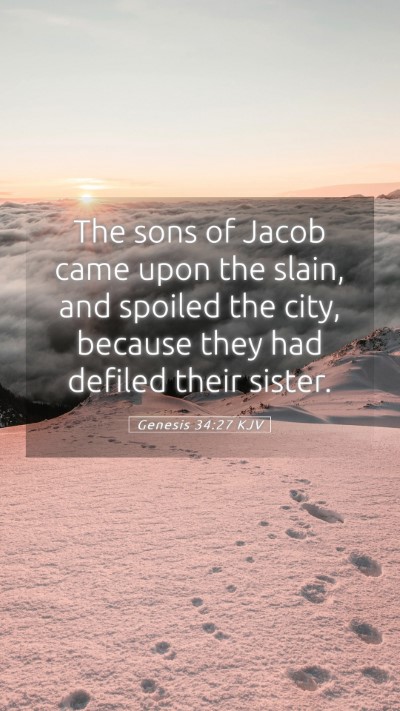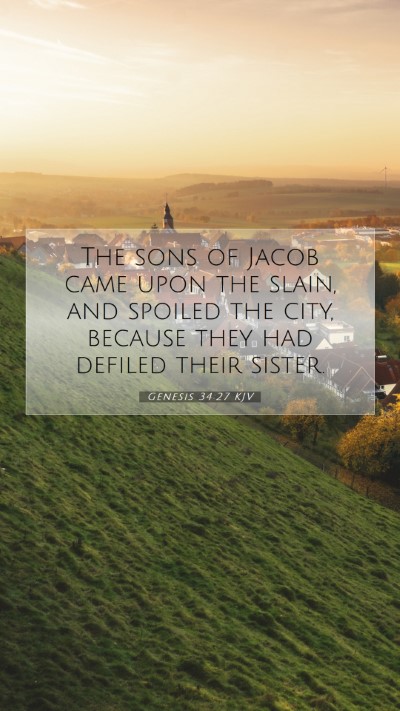Genesis 34:27 states: "The sons of Jacob came upon the slain, and spoiled the city, because they had defiled their sister."
This verse is part of a larger narrative in the book of Genesis, detailing a tragic event that involved Jacob's daughter, Dinah. As we explore the Bible verse meaning of Genesis 34:27, we can draw insights from several public domain commentaries.
Bible Verse Context
The backdrop of Genesis 34 is the story of Dinah, who is violated by Shechem, a Hivite prince. This act of violence against Dinah incites a response from her brothers, leading to an escalation of violence and the eventual destruction of Shechem's city. Understanding this context is crucial to interpreting the meaning of this Bible verse.
Commentary Insights
-
Matthew Henry's Commentary:
Matthew Henry points out the harsh response of Jacob's sons, emphasizing their dishonor and vengeance in reaction to the injustice done to their sister. He highlights the moral implications of revenge and the cycle of violence that emerges when individuals take justice into their own hands. Henry urges readers to consider the tragic consequences that violence can incur on families and communities.
-
Albert Barnes' Notes:
Albert Barnes provides an analysis that sheds light on the motivations of Jacob's sons. He notes that their actions were driven by both rage and a desire to defend family honor. Barnes illustrates how this response ultimately leads to further conflict and the loss of moral standing for Jacob’s family. He urges readers to reflect on the lessons of restraint and the weight of familial honor that often leads to violence.
-
Adam Clarke's Commentary:
Adam Clarke interprets the response of Jacob's sons as a reactionary strike, noting the chilling efficiency with which they enacted their revenge. He emphasizes the repercussions this violence had not just for Shechem's people but also for Jacob's family reputation. Clarke encourages a deeper contemplation on the cost of vengeance and the path of righteousness that believers are called to pursue instead.
Understanding Scripture
The implications of Genesis 34:27 reach beyond the historical event. This passage illustrates the dangers of unchecked anger and the moral dilemmas that accompany vengeance. Bible verse interpretations like this pave the way for deeper discussions on ethics and conduct among believers.
Historical Context
The historical context surrounding Dinah’s narrative is significant. During this time, family honor was tied closely to personal and communal dignity. The actions of Jacob’s sons were seen not just as a response to a crime against their sister, but rather as an affront to the entire family’s honor. This cultural backdrop provides deeper insights into the Bible verse commentary, exploring how similar notions of honor and retribution are prevalent across different societies throughout history.
Application to Daily Life
In applying the meaning of Bible verses such as Genesis 34:27 to daily living, one may reflect on how emotions like anger can lead to destructive decisions. The verse encourages self-reflection on the response to injustice, urging individuals to seek constructive rather than destructive paths in times of conflict.
Related Bible Cross References
- Exodus 20:13: "Thou shalt not kill."
- Proverbs 16:32: "He that is slow to anger is better than the mighty."
- Matthew 5:38-39: "But I say unto you, That ye resist not evil: but whosoever shall smite thee on thy right cheek, turn to him the other also."


